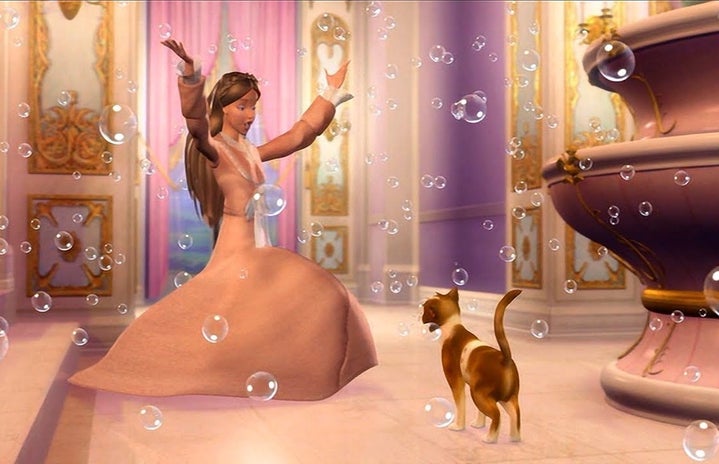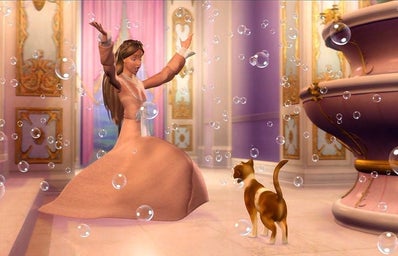So…I have a theory.
Remember Barbie as The Princess and the Pauper? Well, it is my favorite Babrie movie, and after rewatching it a couple of times as an adult I noticed an underlying theme about Wolfie, Erika’s rebellious brown cat.
If you have seen the movie it is clear that this cat is a wannabe dog, which may seem like a basic plot point on the surface level. However, after paying close attention, I think Wolfie’s character is intended to encourage the freedom of gender expression and LGBTQ+ rights.
I’m serious! Go to either the Cat’s Meow song scene or lyric video right now and listen to the lyrics. I could literally write down every single lyric of that song to support my argument.
In the beginning of the song we hear Wolfie trying to meow, and Erika is encouraging him that it is okay to bark if he wants to.
She sings, “If you bark, celebrate it, make your mark, serenade it, Noah’s Ark should have had a cat like you”. Clearly insinuating that if he wants to express himself as something other than he was “assigned at birth” then he should go for it.
Erika goes on to sing, “And if what you are is a strange you, doesn’t mean you should change you, Only means you should change your point of view”. This of course inspires Wolfie that he is not the problem, but the restrictive mainstream point of view is.
At the end comes the sweetest line, “There is not one hair on you that I would rearrange, I love you the way you are and that will never change”. Erika affirms Wolfie that she will always love him no matter if he expresses himself like a dog or a cat.
So, I don’t know about you, but I’m picking up intense progressive undertones here. This song could be interpreted in a multitude of ways, but I’m thinking Wolfie’s character is metaphorical for trans rights.
Some superfans may argue against this since Wolfie marries Serafina at the end, but let’s remember that this movie was from 2004, so any intended symbolism had to be subtle. Plus, I’m pointing out the analogy of his desire to be a dog to gender identity, which is separate from his sexuality. I’ve clearly spent way too much time thinking about this, haha!
Oh well, its a sweet and heart-warming theory. Even if Wolfie doesn’t fully fit within the category of transgender rights, his character is definitely encouraging young viewers that it is okay to express themselves in non-traditional ways, especially in regard to gender norms and expression.
I have always loved this movie, but making this observational theory has strengthened my love for it even more. Go Wolfie, right on!


